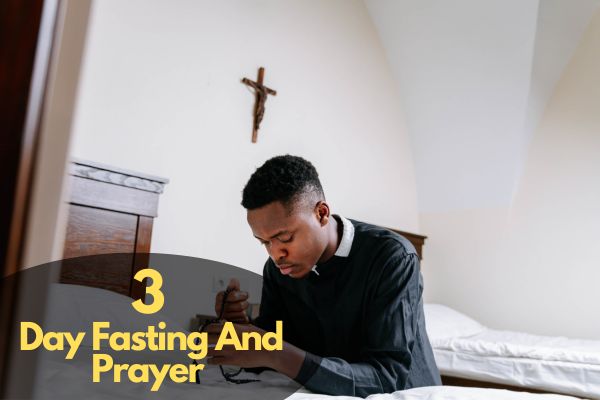Table of Contents Show
Embarking on a 3-day fasting and prayer journey is a profound testament to the resilience of the human spirit and an exploration of the depths of faith and self-discovery. In a world often bustling with noise and distractions, this ancient practice stands as an oasis of introspection and spiritual connection.
3 Day Fasting And Prayer
Fasting and prayer, entwined in traditions spanning centuries and cultures, signify more than mere abstinence from food. It’s a deliberate choice to silence the chaos outside and attune oneself to the whispers within. Through this intentional pause, individuals enter a sanctum of reflection, seeking clarity amidst life’s complexities.
The essence of this practice transcends religious affiliations; it’s a universal conduit for self-discovery and inner growth. Rooted in ancient texts and embraced by sages and scholars, this spiritual discipline holds the promise of transformation—physically, emotionally, and spiritually.
Embarking on a journey of 3-day fasting and prayer is a powerful spiritual practice that has been embraced by individuals across different faiths and cultures. This article explores the significance of 3-day fasting and prayer, its historical and spiritual context, and the transformative effects it can have on one’s spiritual connection and personal growth. By looking into the depths of this practice, individuals can discover a profound way to seek divine guidance, cultivate discipline, and deepen their faith.
Understanding the Spiritual Significance of Fasting and Prayer
In the realm of spirituality, fasting and prayer have long been recognized as powerful practices that deepen one’s connection with the divine. Fasting involves abstaining from food or certain types of food for a specific period, while prayer encompasses the act of communicating with a higher power. When combined, fasting and prayer create a synergistic effect that can lead to profound spiritual growth and transformation.
At its core, fasting is a physical discipline that serves as a symbolic act of self-denial and surrender. By voluntarily refraining from nourishment, individuals demonstrate their willingness to prioritize spiritual nourishment over physical sustenance. Fasting serves as a reminder of our dependence on God and our desire to draw closer to the divine presence.
Prayer, on the other hand, is the conduit through which we communicate with the divine. It is an expression of our faith, gratitude, supplication, and desire for guidance. Through prayer, we open our hearts and minds to receive divine wisdom, comfort, and strength. When combined with fasting, prayer takes on a deeper significance, as the act of emptying ourselves physically through fasting creates space for spiritual connection and revelation.
Exploring the Historical and Biblical Roots of Fasting and Prayer
The practice of fasting and prayer has a rich historical and biblical foundation. Throughout history, various cultures and religions have embraced fasting as a means of spiritual purification and seeking divine favor. In the Bible, numerous accounts highlight the importance of fasting and prayer in the lives of prophets, leaders, and believers.
In the Old Testament, fasting is often associated with repentance, seeking God’s forgiveness, and interceding for the needs of the community. Examples include the forty-day fast of Moses on Mount Sinai, the fasting of the people of Nineveh in response to Jonah’s message, and the fasting of Queen Esther and the Jewish community in Persia.
In the New Testament, Jesus Himself engaged in fasting and prayer, setting an example for His followers. Before beginning His public ministry, Jesus embarked on a forty-day fast in the wilderness, demonstrating the importance of spiritual preparation and reliance on God’s strength. He also taught His disciples about fasting and prayer as integral components of their spiritual lives.
Recognizing the Benefits and Purposes of Fasting and Prayer in Spiritual Growth
Fasting and prayer serve multiple purposes in the realm of spiritual growth. Firstly, they help to discipline and purify the body and mind. Fasting allows individuals to break free from the attachments and cravings of the physical world, cultivating self-control and resilience. This purification process creates space for spiritual insights and heightened awareness of the divine presence.
Secondly, fasting and prayer foster humility and dependence on God. By voluntarily surrendering our physical needs, we acknowledge our reliance on a higher power and express our desire for divine guidance and intervention. This humility opens the door for transformative encounters with the divine and the reception of spiritual blessings.
Furthermore, fasting and prayer can deepen our spiritual discernment and clarity. When we engage in these practices, our minds become less cluttered with worldly distractions, enabling us to attune ourselves to the voice of God and discern His will more effectively. This heightened spiritual sensitivity allows for deeper communion with the divine and a greater understanding of our purpose and calling.
Preparing for a 3-Day Fast
Embarking on a multi-day fast requires careful preparation to ensure both physical well-being and spiritual focus. Here are three essential steps to consider when preparing for a 3-day fast:
1. Setting Intentions and Goals for the Fast: Before beginning a fast, it is crucial to establish clear intentions and goals. Reflect on your spiritual aspirations, areas in need of growth or healing, and specific matters you wish to bring before the divine. Setting intentions will provide focus and direction throughout the fast.
2. Consulting with a Healthcare Professional: It is advisable to consult with a healthcare professional, especially if you have any underlying health conditions or concerns. They can provide guidance on how to safely undertake a fast, ensuring that your body receives the necessary support and monitoring during the process.
3. Gradually Transitioning into the Fast through a Pre-Fast Diet: To minimize the shock to your system, it is beneficial to transition into the fast gradually. Consider following a pre-fast diet that eliminates processed foods, caffeine, and sugar while increasing your intake of fruits, vegetables, and whole grains. This gradual adjustment will help prepare your body for the fasting period.
Remember, fasting is a personal journey, and the approach may vary for each individual. It is essential to listen to your body, practice self-care, and seek guidance from trusted spiritual mentors or leaders as you undertake a 3-day fast.
The Three Stages of a 3 Day Fast
1. Stage 1: Physical Detoxification
Understanding the initial phase of the fast where the body undergoes detoxification, allowing it to cleanse and rejuvenate. Exploring the physical and mental challenges that may arise during this stage and strategies to overcome them.
2. Stage 2: Spiritual Renewal
Looking into the stage where the focus shifts towards spiritual connection and introspection. Exploring methods to deepen prayer and meditation practices, and seeking divine guidance and clarity during this period of heightened spirituality.
3. Stage 3: Reflection and Transition
Examining the final stage where the fast comes to a close. Reflecting on the experiences and insights gained during the fast, and transitioning back to regular eating patterns with mindfulness and gratitude.
The Role of Prayer during a 3 Day Fast
1. Enhancing spiritual connection through prayer
2. Different prayer practices during the fast, such as contemplative prayer, intercessory prayer, and gratitude prayer
3. Using prayer as a tool for self-reflection, surrender, and seeking divine guidance
The Benefits and Transformative Effects of a 3 Day Fast
1. Physical benefits of fasting, including increased energy and mental clarity
2. Emotional and psychological benefits, such as heightened self-awareness and emotional healing
3. Spiritual growth and deepening of faith through the fast
Conclusion
In the culmination of this profound journey of fasting and prayer, one emerges not merely nourished by physical sustenance but enriched by a deeper understanding of self and faith. The three-day voyage, although fleeting in its duration, leaves an indelible mark on the soul.
As we bid adieu to the fasting phase, let us carry forth the lessons imbibed—the quiet strength found in moments of restraint, the clarity discovered in the absence of excess, and the resilience forged in the crucible of self-discipline.
The true essence of this practice lies not just in the fasting period but in the ripples it creates—the mindfulness seeping into everyday actions, the gratitude cultivated for the simplest of blessings, and the empathy extended to fellow sojourners on life’s path.
Embrace this transformative practice not merely as a ritual but as a compass guiding you towards holistic well-being. May the echoes of these three days reverberate in your journey, infusing every step with purpose, gratitude, and an unwavering connection to the divine within.
FAQs
1. Is it necessary to undertake a 3-day fast for spiritual growth?
No, the duration of a fast is a personal choice. While a 3-day fast can be deeply transformative, individuals can experience spiritual growth through shorter or longer fasting periods based on their comfort and spiritual needs.
2. Can anyone undertake a 3-day fast?
It is important to consult with a healthcare professional before undertaking a fast, especially if you have underlying health conditions or are on medication. Fasting may not be suitable for everyone, and professional guidance ensures safety and well-being.
3. How can one maintain energy levels during a 3-day fast?
During a fast, it is essential to stay hydrated and consume nutrient-rich fluids like water, herbal teas, and broths. Resting adequately, practicing gentle physical activities, and listening to the body’s needs can help maintain energy levels.








